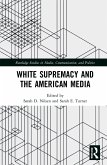The central thesis of this book is that Art Spiegelman's comics all identify deeply-rooted madness in post-Enlightenment society. Spiegelman maintains, in other words, that the Holocaust was not an aberration, but an inevitable consequence of modernisation. In service of this argument, Smith offers a reading of Spiegelman's comics, with a particular focus on his three main collections: Breakdowns (1977 and 2008), Maus (1980 and 1991), and In the Shadow of No Towers (2004). He draws upon a taxonomy of terms from comic book scholarship, attempts to theorize madness (including literary portrayals of trauma), and critical works on Holocaust literature.
Hinweis: Dieser Artikel kann nur an eine deutsche Lieferadresse ausgeliefert werden.
Hinweis: Dieser Artikel kann nur an eine deutsche Lieferadresse ausgeliefert werden.








